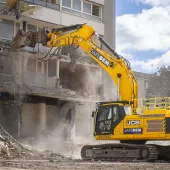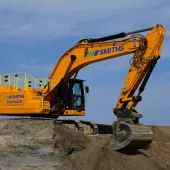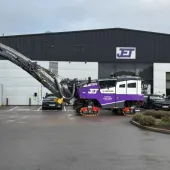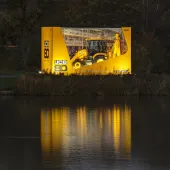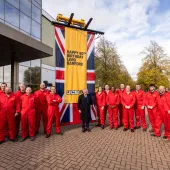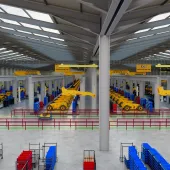Six Pothole Pro machines for Dawsongroup | emc
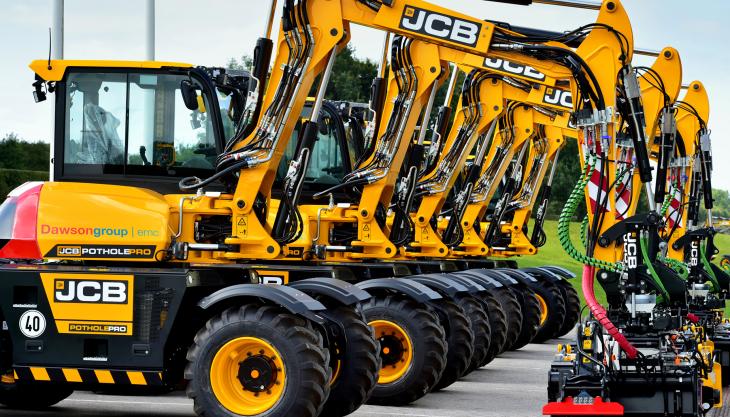
UK company places biggest order to date for JCB’s revolutionary pothole-fixing machine
JCB have struck a major new deal with Dawsongroup | emc, a leading commercial asset supplier, for six of their revolutionary pothole-fixing machines to help tackle Britain’s nine-year backlog of road repairs.
Dawsongroup | emc are investing in the highly productive JCB Pothole Pro machines, which fix potholes permanently, first time, without the need for labour intensive repair methods or additional expensive machinery.
The six machines, bought from dealer TC Harrison JCB, are now being rolled out for rent or contract hire by local authorities and contractors across the country who urgently need to tackle the scourge of potholes as winter approaches.
Demand for the machines is expected to be high as the Asphalt Industry Alliance’s Annual Local Authority Road Maintenance (ALARM) survey estimates there are £12.64 billion worth of outstanding road repairs in England and Wales – equating to a nine-year backlog.
Dawsongroup | emc managing director Glen Carruthers said: ‘This is really exciting for us. The Pothole Pro is an innovative machine which is both time and cost-effective. Our investment gives local authorities and contractors access to the best machines for the job without the need for major financial outlay.
‘Not only is this a highly innovative addition to our product range, but it also means that we are helping to solve a problem that provokes many road users’ frustrations. It is also a significant milestone for Dawsongroup as the company further expands its extensive product range and sector diversification.’
JCB Pothole Pro sales manager Ben Rawding commented: ‘Dawsongroup’s order for six JCB Pothole Pro machines will have a big impact on the nine-year road repair backlog in the UK. It is our biggest order to date for this revolutionary machine and means thousands more miles of road will be repaired quickly and cost effectively as we go into winter.’
He continued: ‘City councils, large rural county councils, and Tier 1 highways contractors across the UK have invested in the Pothole Pro, and all are seeing significantly more defects being fixed, economically, permanently and safely. In fact, Stoke-on-Trent City Council – the first authority to invest in the Pothole Pro – has repaired seven years’ worth of defects in just 12 months.’
Tests with contractors and local authorities show the JCB Pothole Pro can complete a pothole repair in less than eight minutes – four times quicker than standard methods and equivalent to 700 potholes per month. With a 40km/h travel speed, the machine can also rapidly relocate between sites without additional transport costs.
The Pothole Pro can prepare up to 250 sq m of roadway in a single shift, or 5,000 sq m per month and allows the contractor or local authority to cut the defect, crop the edges, and clean the hole with one machine – mechanising jobs traditionally done by pothole gangs and delivering up to a 50% cut in daily costs. Safety is also improved as the gang does not have to carry out hand-held cutting and breaking, eliminating the risk of hand arm vibration syndrome (HAVS).
The JCB Pothole Pro is equipped with a modified Simex planer, with integrated dust suppression, mounted on the machine’s rear skid-steer hitch. The planer is 600mm wide, with up to 1.3m of side-shift adjustment, allowing the operator to plane a full carriageway from the kerb, without repositioning the machine. Hydraulic tilt and depth control provide a consistent depth for larger patches.
The machine’s TAB two-piece boom is fitted with the JCB ‘multi-tool’, mounted on an X12 Steelwrist tilt-rotator. The ‘multi-tool’ consists of two attachments, a dedicated hydraulic cropper and a sweeper/bucket.
The 600mm cropping tool eliminates the need for floor saws or hydraulic breakers, providing a squared off, clean cut to the repair area. The operator then rotates the boom head to bring a 1.2m wide sweeper/bucket into use, to clean up the pothole area, eliminating the requirement for a separate sweeper truck. Material lifted by the sweeper/bucket can be loaded directly into a support truck for rapid removal from site.



